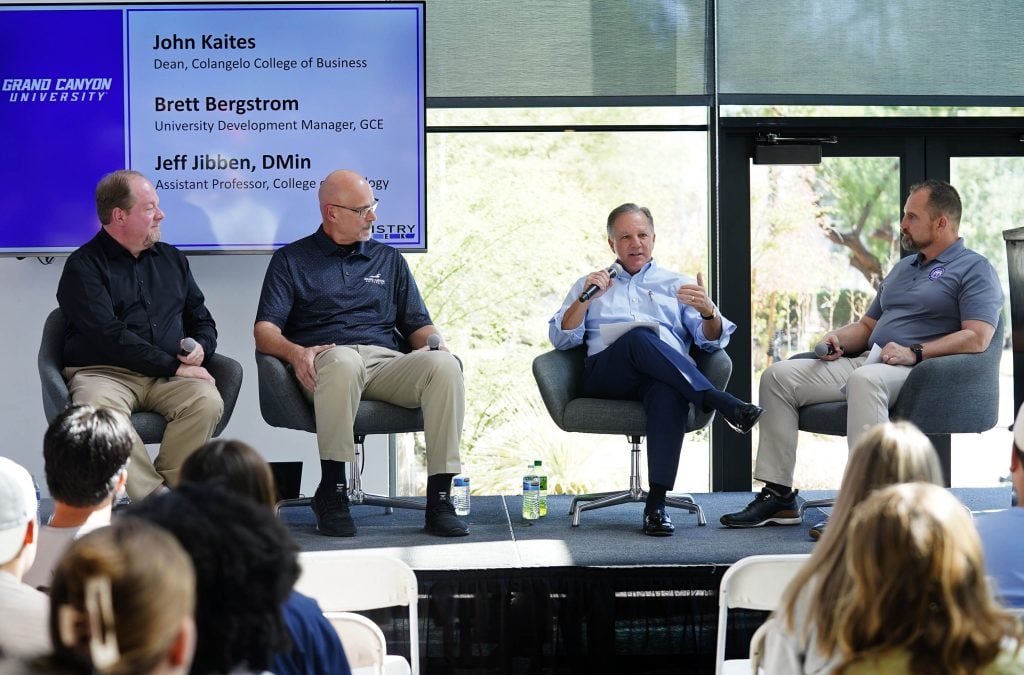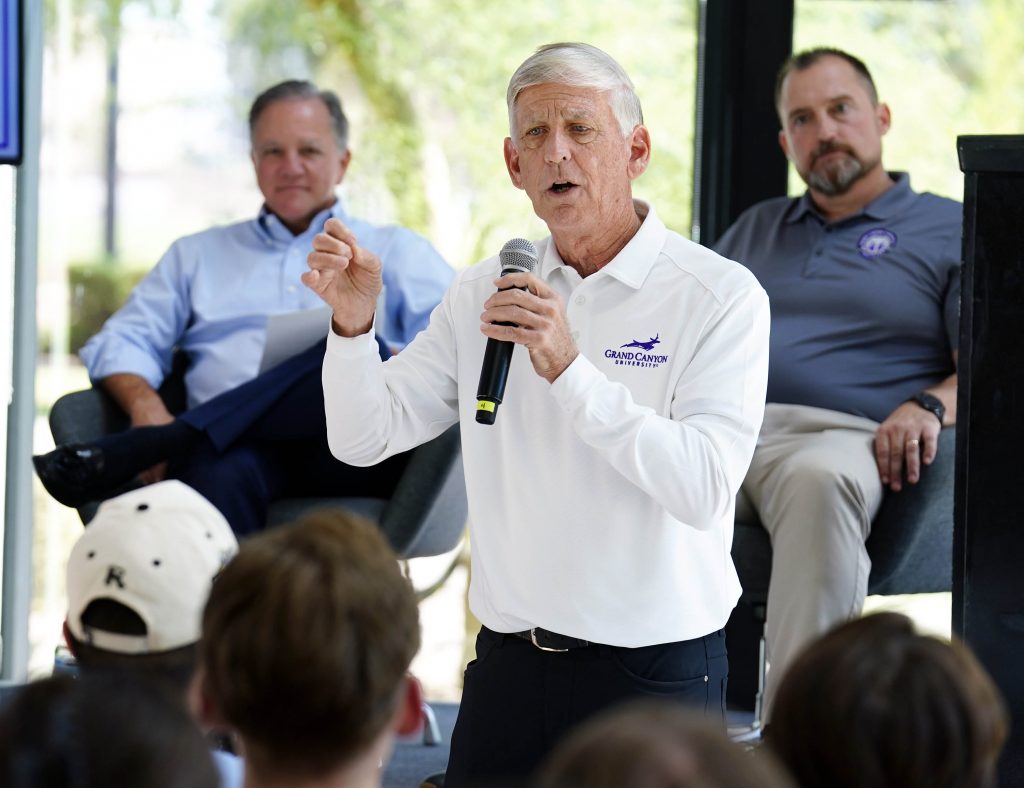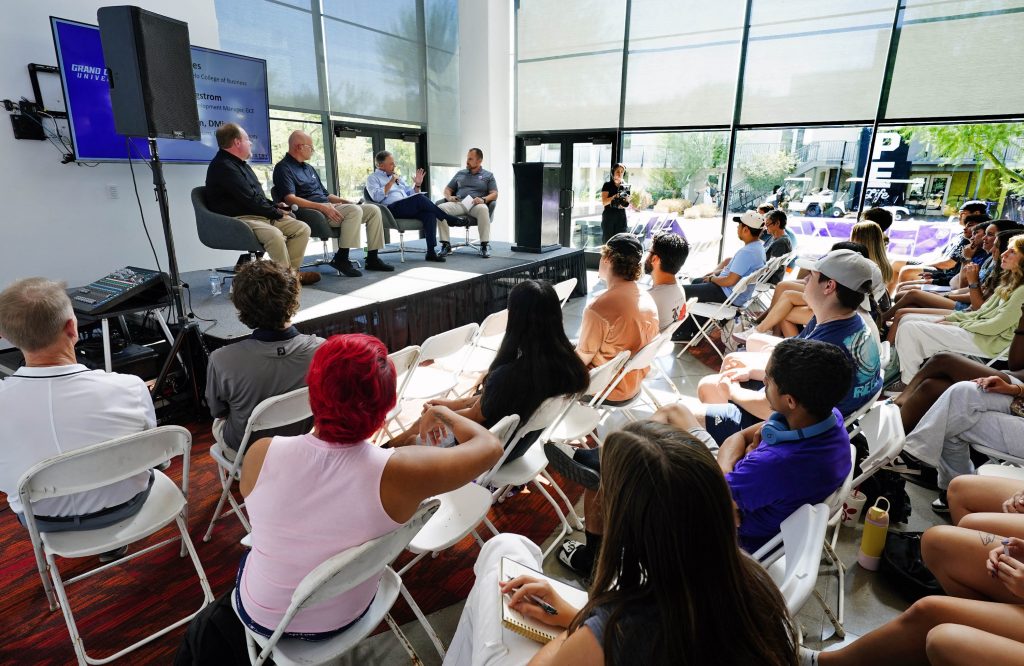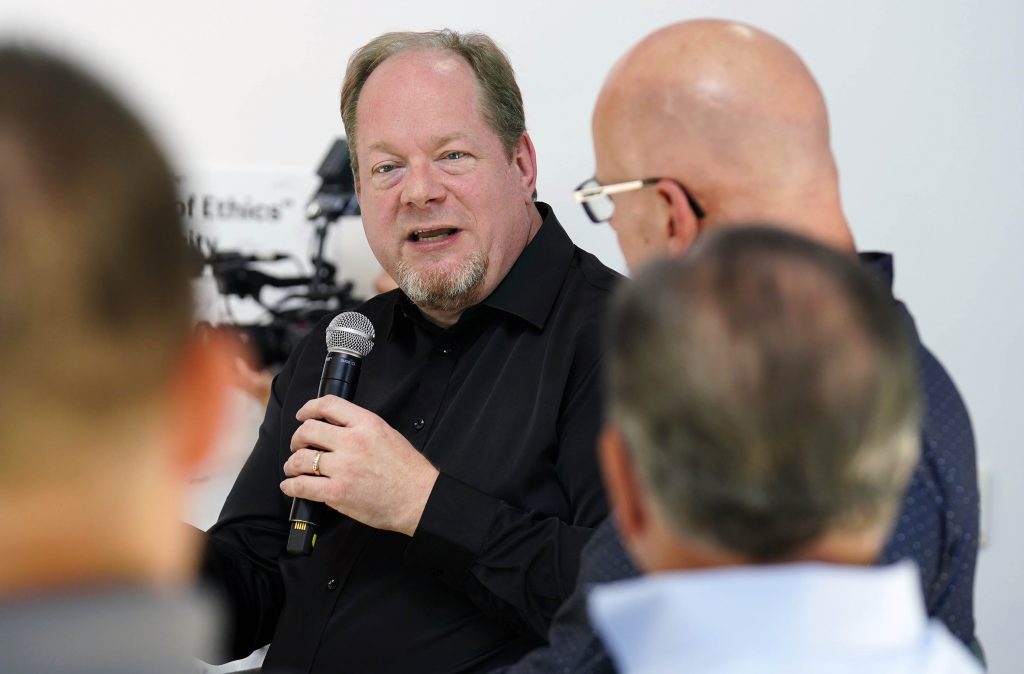
Photos by Ralph Freso
Grand Canyon University has addressed teacher and nursing shortages in the U.S. over the years with specific initiatives, such as scholarships for classroom paraprofessionals and hybrid learning centers for nurses.
Now the university is initiating a drive for bivocational ministry, encouraging students to consider numerous roles in churches in addition to their careers as teachers or engineers or social workers.
“We are not going to do the work that Jesus expects us to do if we are waiting for seminary students. That is not going to get it done. We are not going to build out the church in America and across the world with that number of people,” said GCU President Brian Mueller, introducing a panel discussion Friday on bivocational ministry in the Colangelo College of Business lobby.
He said most churches have less than 100 members and can’t hire numerous fulltime positions, yet still need technology experts on staff, marketing or music professionals, and more.
“Churches need all those skill sets to be successful and grow, in additional to the pastoral teaching and preaching that is the cornerstone of churches,” he said.

College of Theology Dean Dr. Jason Hiles, who moderated the panel discussion, said earlier that there are numerous church starts in growing urban areas that don’t have the resources yet to staff up, and in other areas, there is a “graying of the clergy in the U.S.” without replacements.
Many of the church roles can be served by GCU graduates, such as worship leaders or in women’s ministry. “A lot of them are invested in a local church. They are there every Sunday, they love the Lord, they are leading Bible studies in their dorms, they are in the community helping children and young adults.
“They can pick up any of six or seven minors in the college – Christian studies, biblical studies – and take coursework to understand the Bible better and serve others better on the weekend in church.
“Have you ever considered being a part of ministry? You don’t have to quit your day job.”

Dozens of students were on hand to listen to the panel, many of them business students, their CCOB Dean John Kaites a shining example of bivocational life.
Kaites is a graduate of the Fuller Theological Seminary, served in the Arizona State Legislature and was counsel for prominent Phoenix law firm Fennemore. He owns or is part owner in real estate, technology and construction companies, while being senior pastor at a church revitalization in Ahwatukee. He became CCOB dean in 2023.
Bivocational, he said, means following Jesus where He wants to take you. He said that once he put Jesus at the center of his life, he tackled roles he didn’t think he could do. “I did things that were good, biblically based, and, most importantly, not about me. I leaned into it. The life I have today is so much grander, so much more impactful, than the life I dreamed for myself.”
Numerous academic offerings at GCU, including a business course on church revitalization and planting, for example, or minors offered in the College of Humanities and Social Sciences, such as counseling or communication, can help in pastoral counseling roles or child and family ministries.
“I want you to follow the spirit and not just think of it as two careers but as a vision of loving God and loving others,” he said. “That is my job.
“In your law practice, in your sociology space, in your nursing space and teaching space, it will become obvious to you. You will just naturally be bivocational because of that.”
GCU theology professor and panelist Jeff Jibben said he was trained in biology and chemistry and worked in labs before becoming a manager of a cell phone outlet, while becoming a pastor for 20 years in rural America.
“For lack of a better term, it’s cross pollination,” he said. “There were things I learned in ministry that were a big help in business, and there were things I learned in business that were a big help in the church.”
For example, when the church was considering outreach programs, he put metrics behind it to analyze what worked, and how to market them.

Panelist Brett Bergstrom also had a successful business, selling hot tubs in Surprise, Arizona, until the 2008 recession hit. A pastor asked him to be his assistant, but the pay couldn’t support his family.
“Well, that meant I had to be bivocational. I had to work on the side. I opened up my garage and sold chemicals and serviced (their spas) on the weekends,” he said.
When he was called to plant a church in Houston, he faced a similar financial dilemma. That’s when he found a job with Grand Canyon Education, where today he is university development manager.
His church was held in a day care until it recently moved into its own facility. “We wouldn’t have been able to do that if I was drawing a fulltime salary.”
The workload can be incredible, Bergstrom said, but being open about your two roles is important.
“I don’t want to scare anybody off, but I don’t get a day off. But I don’t need a day off. God provides everything that I need. I get up every morning at 3:30 a.m. I study. I work. He is not going to call you to a place that you can’t do.”
Kaites said his seminary study and life in the church informed his work outside it, growing from a small consulting firm to numerous businesses.
”All that was,” he said, “was taking the word of Jesus and applying them in the secular business world. His words work every time, and they work in every way and in every part of your life.”
Grand Canyon University senior writer Mike Kilen can be reached at [email protected]
***
Related content:
GCU News: First Barnabas Pastoral Program grads ready to make a difference



































































